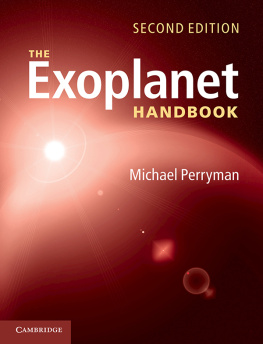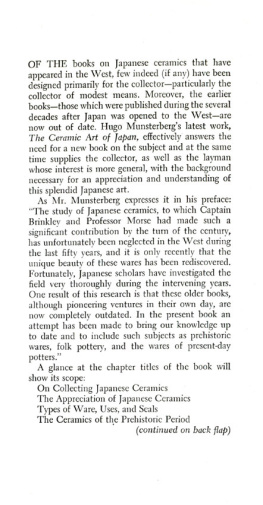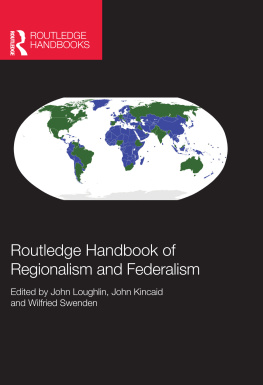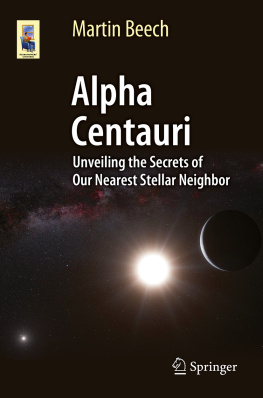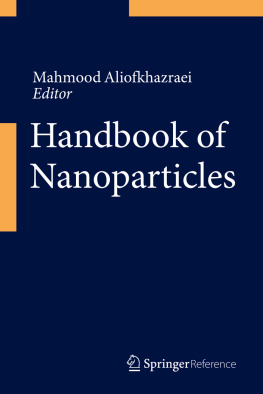Perryman - Exoplanet Handbook
Here you can read online Perryman - Exoplanet Handbook full text of the book (entire story) in english for free. Download pdf and epub, get meaning, cover and reviews about this ebook. year: 2018, publisher: Cambridge Univ Pr, genre: Home and family. Description of the work, (preface) as well as reviews are available. Best literature library LitArk.com created for fans of good reading and offers a wide selection of genres:
Romance novel
Science fiction
Adventure
Detective
Science
History
Home and family
Prose
Art
Politics
Computer
Non-fiction
Religion
Business
Children
Humor
Choose a favorite category and find really read worthwhile books. Enjoy immersion in the world of imagination, feel the emotions of the characters or learn something new for yourself, make an fascinating discovery.
- Book:Exoplanet Handbook
- Author:
- Publisher:Cambridge Univ Pr
- Genre:
- Year:2018
- Rating:5 / 5
- Favourites:Add to favourites
- Your mark:
- 100
- 1
- 2
- 3
- 4
- 5
Exoplanet Handbook: summary, description and annotation
We offer to read an annotation, description, summary or preface (depends on what the author of the book "Exoplanet Handbook" wrote himself). If you haven't found the necessary information about the book — write in the comments, we will try to find it.
Exoplanet Handbook — read online for free the complete book (whole text) full work
Below is the text of the book, divided by pages. System saving the place of the last page read, allows you to conveniently read the book "Exoplanet Handbook" online for free, without having to search again every time where you left off. Put a bookmark, and you can go to the page where you finished reading at any time.
Font size:
Interval:
Bookmark:

The Exoplanet Handbook
Second Edition
With the discovery of planets beyond our solar system 25 years ago, exoplanet research has expanded dramatically, with new state-of-the-art ground-based and space-based missions dedicated to their discovery and characterisation. With more than 3500 exoplanets now known, the complexity of the discovery techniques, observations, and physical characterisation has grown substantially. This handbook ties all these avenues of research together across a broad range of exoplanet science. Planet formation, exoplanet interiors and atmospheres, and habitability are discussed, providing in-depth coverage of our knowledge to date. Comprehensively updated from the first edition, this book includes instrumental and observational developments, in-depth treatment of the new Kepler mission results and hot Jupiter atmospheric studies, and major updates on models of exoplanet formation. With extensive references to the research literature and appendices covering all individual exoplanet discoveries, it is a valuable reference to this exciting field for both incoming and established researchers.
During a 30-year career with the European Space Agency (ESA), Michael Perryman was the scientific leader of the Hipparcos astrometry mission, 198197, also serving as project manager for its operational phase, 198993. With Lennart Lindegren, he was the co-originator of the Gaia astrometry mission, a project expected to make important contributions to exoplanet science in the coming years. He was ESAs project scientist for Gaia from its earliest concepts in 1995 until the Critical Design Review in 2008, establishing the payload concept, technical feasibility, operational and data analysis principles, and its organisational structure, and coordinating its scientific case. He was Professor of Astronomy at Leiden University between 1993 and 2009, and Bohdan Paczyski Visiting Professor at Princeton University in 2013.
The Exoplanet Handbook by Michael Perryman is an exhaustive reference for the techniques, facts and theory of exoplanet science. An excellent and objective resource for novice and expert alike, this compendium is destined for the libraries of all serious students of the art. Adam Burrows, Princeton University
Perrymans book is truly a major achievement: it is an astonishingly complete overview of everything we know about exoplanets. The Exoplanet Handbook will serve as the seminal reference in this field for many years. I would (and will) strongly encourage any graduate students interested in doing serious research in exoplanets to buy a copy of this book. B. Scott Gaudi, The Ohio State University
Michael Perrymans new book provides not only a thorough discussion of what we have learnt about extrasolar planets since the first discoveries over 15 years ago, but also a clear and comprehensive review of the wide range of observational and theoretical techniques that have been employed to find and characterise them. This volume is a must-have for serious researchers in the field, and will be an invaluable reference for many years to come. I. Neill Reid, Space Telescope Science Institute
... more technically detailed and comprehensive than many of the rival texts. ... it is an ideal companion for a Ph.D. student in the field, as well as an excellent reference for the experienced researcher ... this is also an excellent, detailed textbook suitable for a specialist undergraduate or postgraduate lecture course. The Observatory
If I were allowed access to only one book on the subject of extra-solar planets, Michael Perrymans The Exoplanet Handbook is a contender that would be very hard to beat. The book documents the whirlwind development of this newly-emergent and energetic new field of science ... It is also a compendium of essential physical concepts, useful formulae and computational strategies for analysis of the various types of astronomical data used to discover and characterise exoplanets. Andrew Collier Cameron, University of St Andrews
This remarkable compilation brings together observations and theoretical explorations of a rapidly growing astronomical field. Literally every possible observational method is explained and recent results given ... While the number of known exoplanets changes weekly, the methods through which we discover and characterise these do not. Highly recommended. George F. Benedict, University of Texas, Austin
The Exoplanet Handbook provides a very valuable integration of all aspects of the fascinating and interdisciplinary world of exoplanet science. It combines in a coherent context the presentation of the observational techniques, covering recent highlights and future prospects, with the description of the vast range of intertwining phenomena and processes that shape the paths of planet formation, evolution and structure ...The Handbook is an invaluable resource for professional planetary scientists and academic teachers, for both practising astronomers and motivated amateurs, and for advanced undergraduate and graduate students. Vittorio Vanzani, Padua University
This Handbook is a true encyclopedic reference on exoplanets. Perrymans new book is a comprehensive review on major programs and results obtained in the last decade in this exciting new domain of astrophysics and as such it is a priceless resource for experts. The detailed descriptions of the foundations of the main observations techniques and key theoretical aspects make it a perfect book for any student wishing to have a comprehensive introduction to exoplanet research. This volume is likely to become an important reference in the field. Didier Queloz, Geneva Observatory
The Exoplanet Handbook by Michael Perryman is impressive; the content is of high level and very accurate. He has succeeded in providing an exhaustive and up-to-date review of this mature and rich field. The Handbook will surely help Ph.D. students and professional astronomers who want to learn about this field. It will even be useful to experts who want to check details on some specific aspects, either about exoplanets themselves, detection methods, or instrumentation. Jean Schneider, CNRS/LUTH, Paris Observatory
... Michael Perryman ... has written an excellent, startlingly complete snapshot of the current state of knowledge regarding extrasolar planets ... Like any good encyclopedia, The Exoplanet Handbook has as its major strength its reference list, which cites more than 4000 papers. The list provides a near-complete snapshot of all the research that has taken place in the field in the past two decades. Furthermore, the references are deftly integrated into the text, which makes this volume an excellent point of departure for any researcher seeking to chart a new course of exoplanetary investigation. Gregory Laughlin, Physics Today

University Printing House, Cambridge CB2 8BS, United Kingdom
One Liberty Plaza, 20th Floor, New York, NY 10006, USA
477 Williamstown Road, Port Melbourne, VIC 3207, Australia
314321, 3rd Floor, Plot 3, Splendor Forum, Jasola District Centre, New Delhi 110025, India
79 Anson Road, #0604/06, Singapore 079906
Cambridge University Press is part of the University of Cambridge.
It furthers the Universitys mission by disseminating knowledge in the pursuit of education, learning, and research at the highest international levels of excellence.
Font size:
Interval:
Bookmark:
Similar books «Exoplanet Handbook»
Look at similar books to Exoplanet Handbook. We have selected literature similar in name and meaning in the hope of providing readers with more options to find new, interesting, not yet read works.
Discussion, reviews of the book Exoplanet Handbook and just readers' own opinions. Leave your comments, write what you think about the work, its meaning or the main characters. Specify what exactly you liked and what you didn't like, and why you think so.

